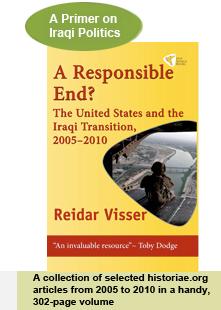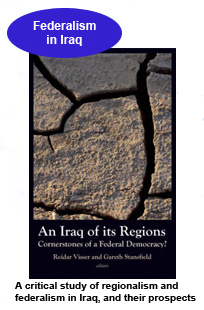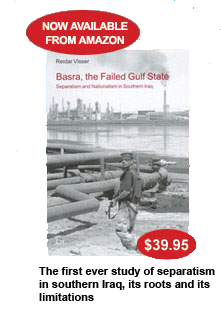



| Main | |
| Documents & images | |
| Links | |
| Contact | |
 | |
| amazon.com |

|
|
|
amazon.com
amazon.co.uk |
|

|
|
|
amazon.com
amazon.co.uk |
|
Signs of Competition in the Struggle about Basra and Federalism?
By Reidar Visser (www.historiae.org)
19 November 2008
The scheme for the transformation of Basra to a federal region has passed its first hurdle after the Iraqi elections commission scrutinised the first submission of petitions demanding a referendum and certified them as representing more than the 2% of the electorate required to launch the process towards a referendum. The Basra federalists now face the far more challenging task of mustering the 10% needed to actually call a popular vote about Basra’s future.
Simultaneously, there are signs that other pro-federal forces in and around Basra are still considering a bid that would compete with the project for a single-governorate federal entity based on Basra. Ever since 2004, other southerners have been working on a similar but slightly bigger federal project that would join Basra to Dhi Qar and Maysan in a tripartite union called the Region of the South (Iqlim al-Janub). This project has been somewhat less prominent since around 2006, but has remained popular in certain circles, including among some tribal leaders. Just like the uni-governorate Iqlim al-Basra scheme it has historically been presented as an alternative to the plan for a much wider nine-governorate sectarian Shiite federal region (Iqlim al-Wasat wa-al-Janub/Iqlim Janub Baghdad) which the Islamic Supreme Council for Iraq (ISCI) tried to promote from August 2005 onwards. With Dhi Qar and Maysan joined to Basra there would hardly be any oil left in the remaining six Shiite-dominated governorates, perhaps with the exception of Wasit.
Whilst the project of a small-scale federal region in the south bigger than Basra but still considerably smaller than the imaginary “Shiistan” is thus well known, the initiators of the recent drive for a petition have so far been less prominent in local politics. This could simply have to do with the fact that the Iqlim al-Janub campaign more generally has received less public attention over the past two years, because unlike the Basra alternative, no major players in local politics have emerged as its sponsors. Still, the sudden re-emergence of the scheme for a tri-governorate federal entity could inspire more sinister interpretations as well. There are many persons outside Basra who first and foremost may want to create trouble for the Basra federalism petition, without being genuinely interested in promoting any kind of federal alternative at this stage. This is precisely the sort of scenario where the legal framework for the further process lacks detail, because an exact deadline for issuing competing calls for a referendum (and hence a pre-referendum poll or istibyan) does not exist in the legal framework that was adopted in October 2006. A third competing call – which is theoretically possible given ISCI’s earlier interest in challenging the southerners – would further complicate matters. There have already been suggestions that ISCI, acting in a spoiler role, could be supportive of the apparent revival of the Iqlim al-Janub project. Back in April 2007, individuals considered friendly to ISCI received much media attention when they quite abruptly organised a conference in Baghdad in support of a small-scale tri-governorate region in the far south that appeared to be incompatible with the grander federal designs of their patrons in ISCI. Still, it should be mentioned that forces that are normally more sympathetic to the Basrawis such as the Fadila leadership in Dhi Qar have also criticised the decision by some Basra leaders to try to go it alone.
For now one can conclude that a number of political trends that have been important in the far south since 2005 have all been revived and highlighted over the past few months. Regional variants of federalism (Iqlim al-Basra and Iqlim al-Janub) are more important than sectarian ones (Iqlim al-Wasat wa al-Janub/Iqlim Janub Baghdad); hence the main struggle in the south is about non-sectarian regionalisms versus Iraqi nationalism – which for its part still seems to remain influential among large parts of the population. Nuri al-Maliki’s tendency in 2007 and 2008 to emphasise centralism instead of ISCI’s variant of federalism could be an attempt at calculating the overall outcome of the competing southern bids for autonomy. At the same time, however, it has become increasingly clear that Maliki’s emergence as some kind of strongman dominating Iraq from Baghdad through using a nominally Iraqi nationalist ideology is not something Iran necessarily finds problematic. On the contrary, in contrast to claims in the Western media about a “life-and-death struggle between Maliki and Iranian hardliners”, it seems likely that the growing Iranian support for a SOFA between Iraq and the United States (already spun by the Iraq i government as a "withdrawal pact") is the result of a masterful undertaking by Tehran to maximise its leverage over a number of players on the Iraqi Shiite scene. In Basra itself, however, Iran is still struggling. The regionalist parties are more friendly with Arab Gulf states than with Tehran, whereas many of the Iraqi nationalists in the area are not especially happy with the particular brand of Iraqi nationalism that Maliki appears to be promoting with Iranian support.
Copyright © 2005-2008 historiae.org & Reidar Visser
This document or quotes from it may be freely reproduced as long as www.historiae.org is credited as the original source.
